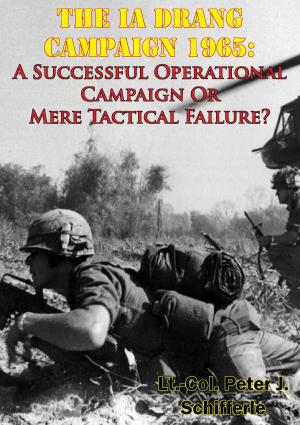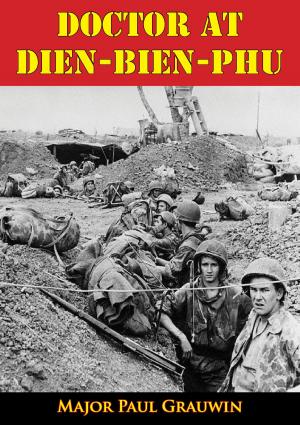Vietnam Studies - Cedar Falls-Junction City: A Turning Point [Illustrated Edition]
Nonfiction, History, Military, Vietnam War, Asian, United States| Author: | Lieutenant General Bernard William Rogers | ISBN: | 9781782893691 |
| Publisher: | Normanby Press | Publication: | August 15, 2014 |
| Imprint: | Normanby Press | Language: | English |
| Author: | Lieutenant General Bernard William Rogers |
| ISBN: | 9781782893691 |
| Publisher: | Normanby Press |
| Publication: | August 15, 2014 |
| Imprint: | Normanby Press |
| Language: | English |
[Includes 1 charts, 17 map, 8 diagrams and 33 illustrations]
.
“Operations CEDAR FALLS and JUNCTION CITY took place during the first five months of 1967 and were the first multidivisional operations in Vietnam to be conducted according to a preconceived plan. They were to result in a turning point in the war: they confirmed that such operations do have a place in counterinsurgency warfare today; they brought an end to the enemy’s thinking that his third phase of the war-large-scale operations throughout the country-would be successful; they caused the enemy to re-evaluate his tactics and revert to smaller-scale guerrilla operations; they destroyed his camps, pillaged his supplies, and killed hundreds of his best troops; they proved to the enemy that his old sanctuaries were no longer inviolable, thus causing him to depend primarily upon those located over the border in Cambodia; they helped convince the enemy that the maintenance of large bases and main force units near urban areas was risky business; and they enhanced immeasurably the confidence of the allied forces in South Vietnam, a confidence which had been growing since the dark days of the first half of 1965. Thus CEDAR FALLS and JUNCTION CITY were to become the most important operations of the war to that time, and perhaps since.
“For the military history buff, Operation CEDAR FALLS will not be nearly so interesting as JUNCTION CITY because it consisted primarily of small unit contacts and the onerous tasks of finding and destroying base camps, storage facilities, and tunnels and of clearing jungles. CEDAR FALLS was unique, however, in that one of its missions was to evacuate some 6,000 inhabitants of the Iron Triangle area and destroy their villages. JUNCTION CITY, on the other hand, was more varied in view of its scope and the fact that there were five battles interspersed among the air assaults and the numerous search and destroy activities."
[Includes 1 charts, 17 map, 8 diagrams and 33 illustrations]
.
“Operations CEDAR FALLS and JUNCTION CITY took place during the first five months of 1967 and were the first multidivisional operations in Vietnam to be conducted according to a preconceived plan. They were to result in a turning point in the war: they confirmed that such operations do have a place in counterinsurgency warfare today; they brought an end to the enemy’s thinking that his third phase of the war-large-scale operations throughout the country-would be successful; they caused the enemy to re-evaluate his tactics and revert to smaller-scale guerrilla operations; they destroyed his camps, pillaged his supplies, and killed hundreds of his best troops; they proved to the enemy that his old sanctuaries were no longer inviolable, thus causing him to depend primarily upon those located over the border in Cambodia; they helped convince the enemy that the maintenance of large bases and main force units near urban areas was risky business; and they enhanced immeasurably the confidence of the allied forces in South Vietnam, a confidence which had been growing since the dark days of the first half of 1965. Thus CEDAR FALLS and JUNCTION CITY were to become the most important operations of the war to that time, and perhaps since.
“For the military history buff, Operation CEDAR FALLS will not be nearly so interesting as JUNCTION CITY because it consisted primarily of small unit contacts and the onerous tasks of finding and destroying base camps, storage facilities, and tunnels and of clearing jungles. CEDAR FALLS was unique, however, in that one of its missions was to evacuate some 6,000 inhabitants of the Iron Triangle area and destroy their villages. JUNCTION CITY, on the other hand, was more varied in view of its scope and the fact that there were five battles interspersed among the air assaults and the numerous search and destroy activities."
![Cover of the book Vietnam Studies - Cedar Falls-Junction City: A Turning Point [Illustrated Edition] by Lieutenant General Bernard William Rogers, Normanby Press](https://www.kuoky.com/images/2014/august/500x500/9781782893691-S0uZ_500x.jpg)

![Cover of the book Last Flight From Saigon [Illustrated Edition] by Lieutenant General Bernard William Rogers](https://www.kuoky.com/images/2014/august/300x300/9781782898955-WJAZ_300x.jpg)
![Cover of the book The Eichmann Kommandos [Illustrated Edition] by Lieutenant General Bernard William Rogers](https://www.kuoky.com/images/2015/november/300x300/9781786253064-uxaT_300x.jpg)








![Cover of the book Vietnam Studies - Allied Participation In Vietnam [Illustrated Edition] by Lieutenant General Bernard William Rogers](https://www.kuoky.com/images/2014/august/300x300/9781782893714-ArZb_300x.jpg)

![Cover of the book Vietnam from Cease-Fire to Capitulation [Illustrated Edition] by Lieutenant General Bernard William Rogers](https://www.kuoky.com/images/2016/august/300x300/9781787200814-ksgO_300x.jpg)
